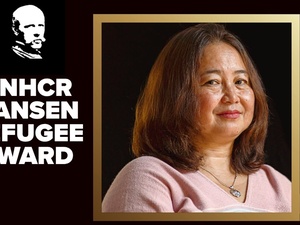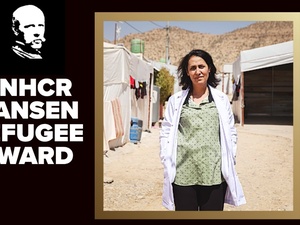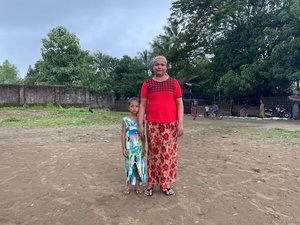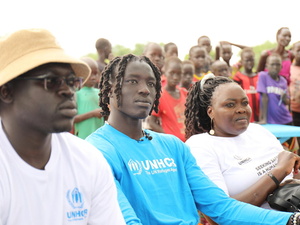Six months on, some 115,000 displaced people in need in Myanmar
Six months on, some 115,000 displaced people in need in Myanmar
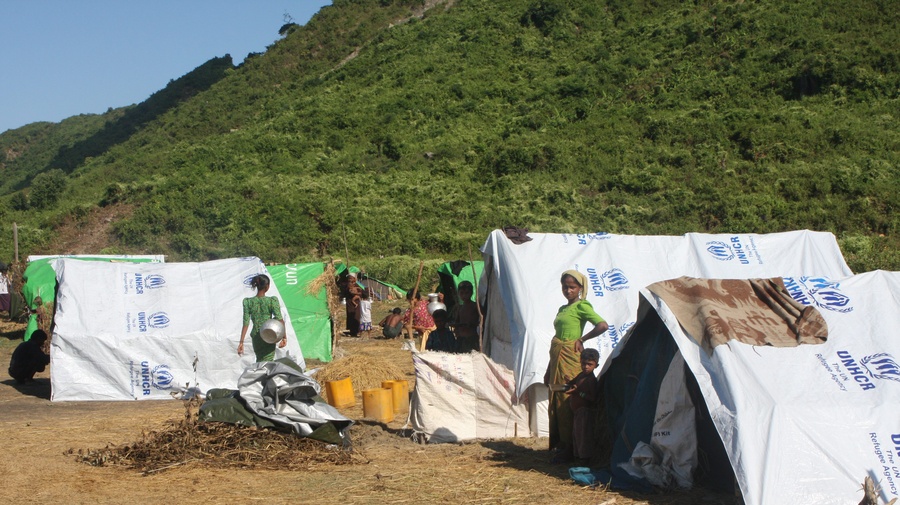
Displaced people in one section of Ah Nauk Ywe makeshift camp in Rakhine state.
YANGON, Myanmar, December 7 (UNHCR) - Six months after inter-communal violence broke out in western Myanmar's Rakhine state, some 115,000 displaced people are still living in challenging conditions. "UNHCR has distributed relief supplies to nearly two-thirds of the affected communities but the needs are still massive," spokesman Adrian Edwards said on Friday.
People are currently unable to return to their homes due to widespread destruction and continuing tensions. "We are working with the Myanmar authorities on awareness of proper standards for safe and voluntary return when the right conditions are in place. In addition, we continue to advocate citizenship as a solution for those who are displaced and without nationality," Edwards noted.
More than 100 people were killed and thousands of homes destroyed in waves of unrest in June, August and late October. Today the displaced people are living with host families and in relief camps and temporary sites.
In recent weeks, makeshift shacks have sprouted on roadsides in the Rakhine state capital, Sittwe. Some shack dwellers say their host families could no longer support them while others are believed to have come from remote camps in the hope of getting assistance.
This week UNHCR erected tents donated by the Korea International Cooperation Agency to provide better shelter for these recent arrivals. The refugee agency has also moved approximately 5,000 people into longhouse-style bamboo huts on the outskirts of Sittwe. "We are also building additional ones for more than 12,000 and more than 220 permanent homes for returnees in Maungdaw," Edwards said.
As part of the inter-agency response to the emergency in Rakhine state, UNHCR is leading efforts in protection, shelter, non-food items and camp coordination and management for the displaced people. The assistance is targeted at both affected communities based on their needs.
To date, UNHCR has distributed aid items, including plastic sheets, blankets and kitchen sets, to some 70,000 people. An additional 3,500 UNHCR tents are scheduled to arrive by boat in Sittwe this weekend to provide emergency shelter to people displaced in October, and now in scattered locations.
UNHCR is working with the authorities and other humanitarian agencies to ensure basic standards in the relief camps around Sittwe. Shelters, for example, need to be properly spaced out to prevent overcrowding and the potential health and social problems associated with overcrowding. UNHCR is also advocating for the provision of water, sanitation and health care services, and a way of managing the camps that involves the displaced communities themselves.
There are still areas in Rakhine state that are hard to reach due to their remote location and continuing tensions. Nonetheless, UNHCR staff have distributed basic relief items and are advocating with the government and partners to improve site planning and provide basic services there.
Some NGO staff have been reluctant to go to certain areas where inter-communal tensions are still high. In Myebon, UNHCR has been distributing aid and providing transport for doctors to attend to the sick.
At the same time, efforts must begin to pave the way for the eventual return of displaced people in safety and dignity. UNHCR has been urging the government to do more in the affected villages to promote tolerance and peaceful co-existence between the two communities, so as to create an environment conducive for return.
The UN refugee agency has received less than 30 per cent of the US$24.35 million it needs to care for the displaced people in Rakhine state until June.




